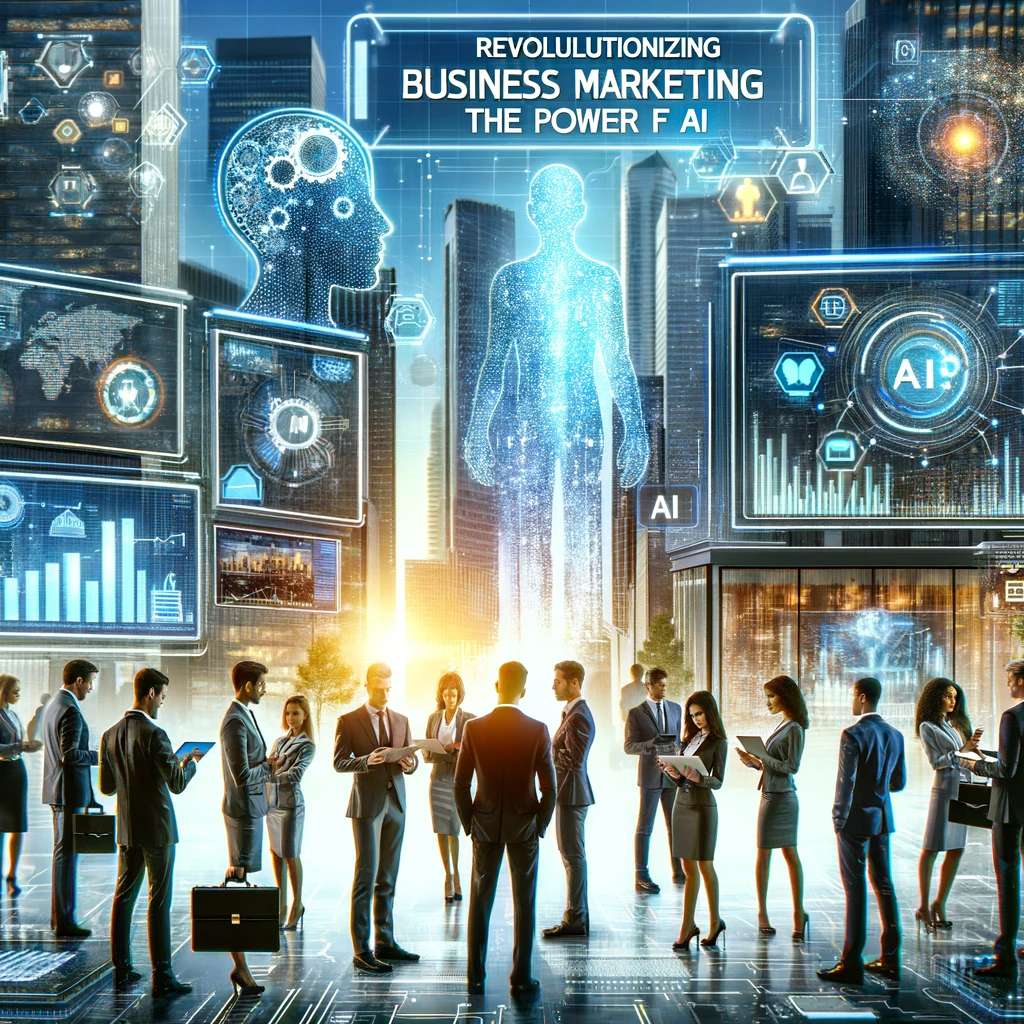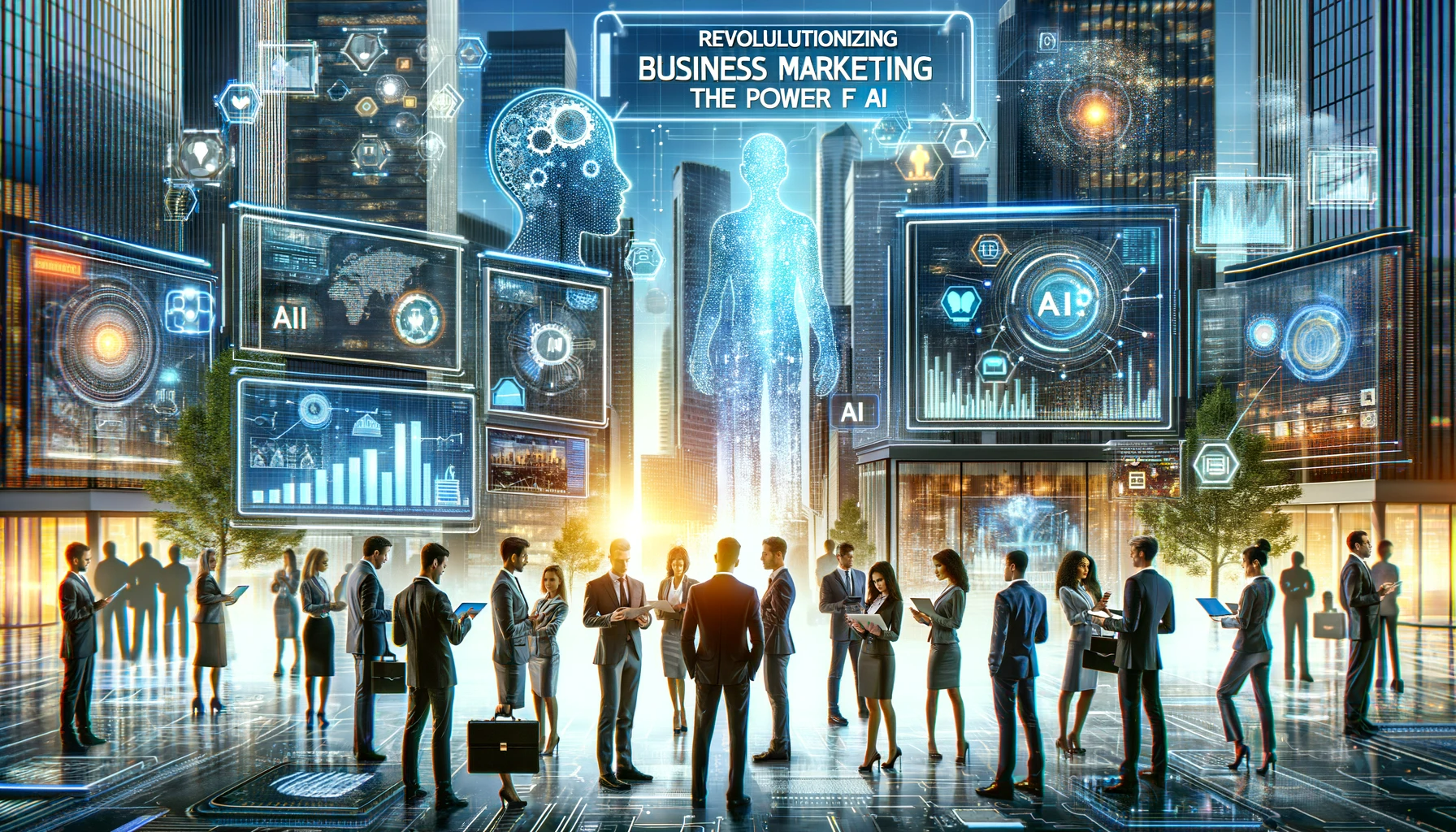Introduction
In the ever-evolving landscape of business marketing, the Power of AI (artificial intelligence) stands as a transformative force. Gone are the days of traditional marketing approaches. Today, AI’s integration into marketing strategies is not just a trend but a crucial element for success. This integration marks the beginning of an era where data-driven insights, automation, and personalized customer. The experiences are reshaping the way businesses connect with their audience.

The Role of AI in Business Marketing
AI has significantly changed how businesses approach marketing. Its applications range from data analysis to customer service, offering a comprehensive toolkit for modern marketers.
- Data Analysis and Insights: AI algorithms excel in processing large datasets to extract meaningful insights. This ability enables marketers to understand consumer behavior, market trends, and campaign performance at an unprecedented level. Predictive analytics, a facet of AI, can forecast future trends and customer actions, allowing businesses to stay ahead of the curve.
- Personalization and Customer Engagement: AI empowers marketers to create highly personalized customer experiences. By analyzing individual customer data, AI can tailor marketing messages and offers to align with each customer’s preferences and history. This personalization extends to AI chatbots and virtual assistants, which provide instant, personalized customer service, enhancing engagement and satisfaction.
- Content Creation and Curation: AI tools are now capable of generating creative content, including writing copy, designing graphics, and even composing music. Moreover, AI can curate content to match the interests of specific audience segments, ensuring that the content delivered is relevant and engaging.
- Efficient Marketing Operations: Automation powered by AI streamlines various marketing operations such as email campaigns, social media posts, and ad placements. This efficiency not only saves time and resources but also optimizes campaign effectiveness by ensuring timely and targeted delivery.
Benefits of The Power of AI in Marketing Strategies
The integration of AI in marketing strategies offers numerous benefits:
- Enhanced Customer Insights: AI’s data processing capabilities provide deeper insights into customer preferences and behavior, enabling more targeted and effective marketing strategies.
- Increased ROI: AI-driven campaigns often result in higher engagement rates and conversions, leading to an improved return on investment.
- Scalability: AI can handle tasks at a scale that is impossible for human teams, allowing businesses to scale their marketing efforts without proportional increases in resources.
- Real-Time Decision Making: AI’s ability to analyze data in real-time helps businesses make quick, informed decisions, staying agile in dynamic market conditions.
The Future of The Power of AI in Business Marketing
Looking ahead, AI is set to become even more integral to marketing strategies. Emerging technologies such as augmented reality (AR), virtual reality (VR), and advanced machine learning algorithms will further enhance the capabilities of AI in marketing. Personalization will reach new heights, with AI creating completely individualized customer journeys. Additionally, AI’s role in ethical and sustainable marketing will become increasingly important, guiding businesses to engage in practices that are socially responsible and environmentally friendly.
As we enter this new era, the combination of marketing and AI will not only change the ways that companies interact with their customers, but it will also establish new benchmarks for customer satisfaction, operational effectiveness, and competitiveness in the market.
Navigating the Challenges and Ethical Considerations
While AI presents vast opportunities, it also comes with challenges and ethical considerations. Privacy concerns, data security, and the potential for AI bias are significant issues that businesses must address. Ensuring transparency in AI operations and adhering to data protection regulations are vital for maintaining customer trust and ethical standards.
Integrating AI into Your Marketing Strategy
To effectively integrate AI into marketing strategies, businesses should:
- Start with Clear Objectives: Define what you want to achieve with AI. Whether it’s improving customer engagement, personalizing marketing messages, or streamlining operations, having clear goals is essential.
- Invest in Quality Data: AI’s effectiveness is heavily dependent on the quality and quantity of the data fed into it. Investing in data collection and management is crucial.
- Choose the Right Tools and Partners: Not all AI solutions are created equal. It’s important to select tools and partners that align with your specific marketing needs and objectives.
- Foster a Culture of Continuous Learning: The field of AI is rapidly evolving. Encouraging a culture of learning and experimentation within your team is key to staying ahead in the game.
Conclusion
AI in business marketing is not just a passing trend; it’s a fundamental shift in how we approach customer engagement and experience. By leveraging the power of AI, businesses can unlock new levels of personalization, efficiency, and insight, leading to more effective and successful marketing strategies. As we look to the future, the integration of AI in marketing will continue to evolve, offering even more innovative ways to connect with and understand customers. The businesses that embrace this change and adapt to its possibilities will be the ones leading the charge in the new frontier of marketing.
Also, Visit my other post AI vs Machine Learning: What Marketers Need to Know


Add a Comment